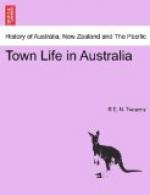The history of our educational evolution is perhaps worth summarizing. In the early days of colonization the Church of England spun an educational cobweb, which it has been very difficult to sweep away, and which still remains in a fragmentary state as an evidence of past good service. When the education of the first settlers was in danger of being altogether neglected, the Church put forth the greatest energy to meet their wants, raising funds both here and at home to provide schools and teachers. The Catholics, and later on other denominations, followed her example; and thus, at a time when the State was fully occupied with attending to more primary wants, an education was provided which, considering the circumstances and viewed according to the lights of those days, was highly creditable. The State subsidized these schools, as well as others which were established by private venture in townships where no denomination was sufficiently powerful to establish a school at its own cost. Boards were appointed to control the subsidies and roughly estimate the teaching of each school, and in New South Wales these boards had also power to establish national as opposed to denominational schools wherever opportunity offered. You can easily imagine how inefficient and extravagant this subsidizing arrangement proved. In small townships where a single State school could have given a good education to all the children in the district, there arose two or three denominational schools, all drawing money from the public purse, and yet each too poor and too small to teach well. At last in 1873 Victoria led the way in discarding the denominational schools, and starting at enormous expense an official system of free, compulsory, and secular primary instruction throughout the colony.
In 1876 South Australia followed suit, though in that colony the schooling is only free to those who cannot afford to pay a fee of fourpence per week for children under seven, and sixpence for older children. Finally in 1880 New South Wales also threw off the yoke, which she had only borne longer than her neighbours because her old system was far superior to theirs. Here, too, a weekly fee of threepence per child is demanded, but no family may pay more than a shilling per week, however large in number, and in cases of inability the fees are remitted.
All three Education Acts agree in their main bearings, though differing considerably on points of detail. The system of district and local boards of advice is largely made use of in all of them, but the compulsory clauses have never been properly enforced, principally on account of the great difficulty of doing so in thinly populated districts. The word ‘secular’ admits of different variations in each province. In Victoria moral truths form the limit. In New South Wales an hour a day is set apart for religious instruction from the mouth of a clergyman or other religious teacher, if the parents do not object.




